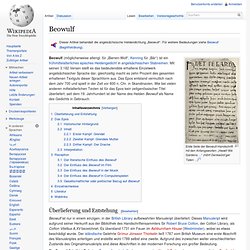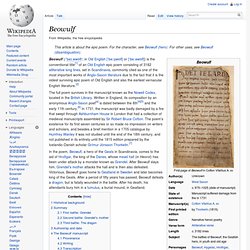

Beowulf Audio-0194a-0224a-benslade. Bibliography 1. Beowulf. Erste Seite der Beowulf-Handschrift mit den Anfangsworten: „Hwæt!

Wé Gárdena …“ (Hört! Denkwürd’ger Taten …)[1] Beowulf (möglicherweise altengl. für „Bienen-Wolf“, Kenning für „Bär“) ist ein frühmittelalterliches episches Heldengedicht in angelsächsischen Stabreimen. Mit seinen 3.182 Versen stellt es das bedeutendste erhaltene Einzelwerk angelsächsischer Sprache dar; gleichzeitig macht es zehn Prozent des gesamten erhaltenen Textguts dieser Sprachform aus. Beowulf - engl. Wikipedia. Beowulf (/ˈbeɪ.ɵwʊlf/; in Old English [ˈbeːo̯wʊlf] or [ˈbeːəwʊlf]) is the conventional title of an Old English epic poem consisting of 3182 alliterative long lines, set in Scandinavia, commonly cited as one of the most important works of Anglo-Saxon literature due to the fact that it is the oldest surviving epic poem of Old English and also the earliest vernacular English literature.[2] The full poem survives in the manuscript known as the Nowell Codex, located in the British Library.

Written in England, its composition by an anonymous Anglo-Saxon poet[a] is dated between the 8th[5] and the early 11th century.[6] In 1731, the manuscript was badly damaged by a fire that swept through Ashburnham House in London that had a collection of medieval manuscripts assembled by Sir Robert Bruce Cotton. Historical background[edit] Mittelalterliche Heldendichtung - VL 2005 - Prof. Albrecht Ebenbauer. Beowulf - Manuskript.